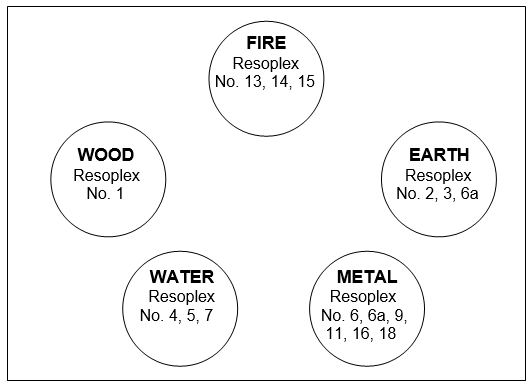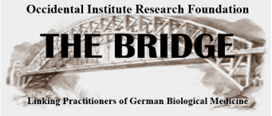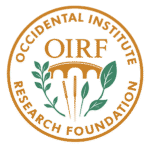Part 2: Pathogenetic Resonance Chains
As early as the 1970’s Dr. Schimmel noticed that many chronic diseases had common pathogenetic patterns. Normally then two or three therapists are busy with such a series, and they often treat independently of each other.
If these connections are better recognized today, then it is probably entirely due to Dr. Schimmel who published his knowledge at that time in his book “Functional Medicine” by Haug Publishing Company.
Concerning this Dr. Schimmel says:
“The Causal Chains (Resonance Chains) challenge the causal analytical thinking about closed-loop control circuits. Not only one organ becomes diseased, but several organs can become diseased causal chain-like and thus can be connected with each other. Thus one single organ is the actual symptom carrier and our attention is attracted to it, for example threatening heart complaints – even with suspected infarct indications – however the real cause is a toxic pancreas burden. Even still today, they will exclusively treat the heart and circulation in such cases and little thought is given to a pancreas disease. The consequences are often in infarct recurrence and finally the final “end”.
The Causal Chains (Resonance Chains) are not a manifestation of momentary medical fashion, but rather a law of nature-like sequence of events, which were always there and which until now were not heeded enough. Also the symptomatology of the Causal Chains (Resonance Chains) is not any harmless functional disturbance that you can handle with home remedies, but it concerns widespread symptoms with chronic illness characteristics which are often life threatening and which cost much money and valuable life.”
Pathogenetic Resonance Chains According to Dr. Schimmel
The Resonance Chains were described by Dr. Schimmel according to their clinical symptomatology. We changed the original numbering somewhat, since we classified the Resonance Chains additionally to the system of the Transformation Phases [of Chinese Medicine]. Through this nothing changes for the clinician. The natural physician or naturopath with experience in classical Chinese Medicine has an additional possibility to better grasp and classify the connections of the Resonance Chains by the allocation to the system of the Transformation Phases. (For Transformation Phases and their organ allocations see Figure 3.)

Figure 3: Transformation Phases and Organ Classifications
Resonance Chains and the Transformation Phases
We call direct physiological connections “Primary Resonance Chains”. Functional secondary damages to the primarily affected organs are understood through “Secondary Resonance Chains”. For example, the heart can become diseased because of a Röhmheld symptomatology from the disturbance of the Bile/Gallbladder Resonance Chain. (The organs of the “Secondary Resonance Chain” are in parentheses.)
1. Wood Transformation Phase
Bile/Bile Ducts Resonance Chain
⇒ Main Symptoms: Temporal headache/migraine, ear problems (noises, hearing disturbances, vertigo), visual disturbances, cervical vertebral column problems, prevailing depressive mood, epigastric complaints
Primary Resonance Chain (Secondary Resonance Chain)
- Bile/Bile Ducts – eye, cerebrum, ear
- Bile/Bile Ducts – cervical vertebral column
- Bile/Bile Ducts – kidney/ureter (prostate/ovary, external genitals, lumbar vertebral column-sacral area)
- Bile/Bile Ducts – liver, spleen, pancreas, stomach, small intestine, large intestine (heart)
- Bile/Bile Ducts – (shoulder)
Liver Resonance Chain
⇒ Main Symptoms: Complaints in the right epigastrium, chronic sinusitis, poor alcohol tolerance, allergies (intolerances)
Primary Resonance Chain (Secondary Resonance Chain)
- Liver – mucous membranes of the head/paranasal sinuses/tonsils, teeth
- Liver – bile (kidney/ureter, prostate/ovary), pancreas/spleen (stomach/heart), small intestine, large intestine (tonsils, paranasal sinuses, mucous membranes of the head)
- Liver – circulation, eye
- Liver – (skin)
2. Fire Transformation Phase
Heart Resonance Chain
Besides functional disturbances, here the Heart Resonance Chain is considered also in the context of acquired or hereditary anatomical disturbances. Heart and pericardium are considered separately in Chinese Medicine, but in the long run form a functional unit. The small intestine which belongs in the fire element in Chinese medicine, here however primarily has more psychological functions and is therefore discussed with the large intestine in the metal element.
⇒ Main Symptoms: Heart and circulation symptoms (vertigo, pallor, etc.), pain in the area of the heart, pain in the left arm up to the lower jaw, nausea with anxieties, disturbances of the arterial vessel system
Primary Resonance Chain (Secondary Resonance Chain)
- Heart – circulation/arteries, pancreas, kidney/adrenal gland (ear), large intestine
- Heart – (teeth 18, 28, 38, 48)
3. Earth Transformation Phase
Stomach Resonance Chain
⇒ Main Symptoms: Maxillary sinusitis, trigeminal neuralgia 2nd branch, epigastric complaints in the stomach region
Primary Resonance Chain (Secondary Resonance Chain)
- Stomach – mucous membranes of the head, paranasal sinuses, tonsils, trigeminal nerve (kidney/adrenal gland)
- Stomach – liver/bile, pancreas/spleen (heart), small intestine, large intestine
- Stomach – kidney/adrenal gland (prostate/ovary, ureter)
- Stomach – (breast)
- Stomach – (shoulder)
Spleen/Pancreas Resonance Chain
⇒ Main Symptoms: Functional heart complaints (arrhythmia, tachycardia, pain in the left arm, anxiety, sleep disturbances, pre-infarct symptoms), chronic rhinitis/sinusitis, skin mucous membrane symptoms (e.g. palmar eczema), pseudorheumatism, joint complaints, epigastric complaints (meteorism, fungal infestation, etc.), prostate/ovary, glandular swelling of the breast
Primary Resonance Chain (Secondary Resonance Chain)
- Pancreas/Spleen – mucous membranes of the head/paranasal sinus/tonsils (kidney/adrenal gland/pituitary gland/thyroid gland)
- Pancreas/Spleen – joints
- Pancreas/Spleen – heart (important connection discovered by Dr. Schimmel)
- Pancreas/Spleen – prostate/ovary (thyroid/pituitary)
- Pancreas/Spleen – small intestine, large intestine, liver/bile (stomach)
- Pancreas/Spleen – (parotid gland)
- Pancreas/Spleen – (breast)
- Pancreas/Spleen – (shoulder)
4. Metal Transformation Phase
We additionally classify the Mucous Membranes of the Head/Paranasal Sinuses/Tonsils Resonance Chain as well as the Skin Resonance Chain to the Metal Transformation Phase (lung/large intestine).
Small Intestine/Large Intestine Resonance Chain
⇒ Main Symptoms: Colon dysbacteria (putrefaction, fungi), allergic symptoms (intolerances), trigeminal neuralgia 2nd branch, shoulder complaints, tennis elbow, toxic liver parenchyma burdening, chronic gingivitis, recurring lumbar vertebral column complaints
Primary Resonance Chain (Secondary Resonance Chain)
- Small Intestine/Large Intestine – mouth mucous membrane/paranasal sinus/tonsils/teeth/trigeminus (prostate/ovary)
- Small Intestine/Large Intestine – kidney/adrenal gland (prostate/ovary, thyroid/parathyroid/pituitary/hypothalamus, ureter)
- Small Intestine/Large Intestine – spleen/pancreas (stomach)
- Small Intestine/Large Intestine – liver/bile (stomach)
- Small Intestine/Large Intestine – skin
- Small Intestine/Large Intestine – lung
- Small Intestine/Large Intestine – lumbar vertebral column
Mucous Membranes of the Head/Paranormal Sinuses/Tonsils/Teeth Resonance Chain
⇒ Main Symptoms: Mostly the symptoms show a focus characteristic (focus induced neuralgia/neuritic trigeminus, sciatica), iritis, conjunctivitis, choroiditis, otitis, inflammation of the heart and respiratory organs (myo-, peri- and endocarditis), inflammation of the urogenital system (pyelitis, prostatitis, adnexitis, cystitis, epididymitis, endometritis), autoaggressions (rheumatism, Bechterew, etc.)
Primary Resonance Chain (Secondary Resonance Chain)
- Mucous Membranes of the Head – heart, lung, bronchi
- Mucous Membranes of the Head – limb joints and vertebral joints
- Mucous Membranes of the Head – small intestine, large intestine (liver/bile, stomach/spleen/pancreas)
- Mucous Membranes of the Head – kidney/bladder, prostate/ovary, ureter
- Mucous Membranes of the Head – teeth
- Mucous Membranes of the Head – (thyroid/parathyroid)
Lung (Respiratory Tract) Resonance Chain
⇒ Main Symptoms: Chronic atrophic gingivitis with pouch formation; kidney disturbance; skin diseases; heart diseases; vessel, muscle and lymph systems of the lung and bronchi
Primary Resonance Chain (Secondary Resonance Chain)
- Lung – heart and circulation
- Lung – skin
- Lung – kidneys
- Lung – small intestine, large intestine, stomach, liver/bile
- Lung – diaphragm (pancreas, prostate/ovary)
- Lung – mucous membranes of the head (prostate, joints)
Skin Resonance Chain
⇒ Main Symptoms: Skin rash eruptions (eczema, rhagades, rubescence, fungal infestations, etc.)
Primary Resonance Chain (Secondary Resonance Chain)
- Skin – lung
- Skin – kidney
- Skin – small intestine, large intestine
- Skin – liver/bile
- Skin – ovary/testicle/thyroid
- Skin – (mucous membranes of the head)
5. Water Transformation Phase
Kidney Resonance Chain
⇒ Main Symptoms: Kidney disturbances, bronchial disorders, skin diseases (inguinal- and foot sole eczemas), old hyperacidic gastritis
Primary Resonance Chain (Secondary Resonance Chain)
- Kidney – lung, heart/circulation
- Kidney – skin (small intestine, large intestine)
- Kidney – joints, vertebral column
- Kidney – bladder, prostate, ureter (lumbar vertebral column)
- Kidney – stomach/pancreas
Prostate/Uterus/Ovary/Testicle Resonance Chain
⇒ Main Symptoms: Hormonal dysfunction, diseases of the retina/choroids, Achilles tendon, joints, sciatica, vertebral column complaints, frontal and maxillary sinuses
Primary Resonance Chain (Secondary Resonance Chain)
- Prostate/Uterus/Ovary/Testicle – cerebrum, eye, retina
- Prostate/Uterus/Ovary/Testicle – kidney/adrenal gland, ureter, bladder (liver/bile, pancreas, small intestine, large intestine, thyroid/parathyroid)
- Prostate/Uterus/Ovary/Testicle – vertebral column, sciatica
- Prostate/Uterus/Ovary/Testicle – mucous membranes of the head, teeth, (pituitary/hypothalamus)
Bladder Resonance Chain
⇒ Main Symptoms: Hormonal dysfunction, chronic cystitis, vertebral column diseases
Primary Resonance Chain (Secondary Resonance Chain)
- Bladder – prostate/ovary (pancreas, small intestine, large intestine, liver/bile)
- Bladder – kidney
- Bladder – vertebral column, sciatica
- Bladder – cerebrum, eye, retina
- Bladder – mucous membranes of the head
Dr. Schimmel described another two further resonance chains which cannot be classified into a specific Transformation Phase:
Central Nervous System Resonance Chain
⇒ Main Symptoms: Vegetative disturbances (distress), fatigue, and concentration and memory disturbances.
Primary Resonance Chain (Secondary Resonance Chain)
- CNS – vegetative and peripheral nervous system
- CNS – heart/circulation
- CNS – all organs
- CNS – all hormone glands
Glands Resonance Chain
⇒ Main Symptoms: Psycho-vegetative disturbances, tumor-like changes
Primary Resonance Chain (Secondary Resonance Chain)
- Glands – all glands are in connection
- Glands – cystic changes, promotion of tumor formations
Indications for Therapy with the Resonance Chains
The therapy with Resonance Chains is based on three principles:
- Functional energetic diagnosis by means of the Photon Resonance Test (PRT). Also other diagnostic possibilities can be used to isolate the causally affected organs.
- Elimination of viruses, fungi, etc. by means of Resonance Homeopathics in Levels 3 and 4.
- Drainage by means of Resonance Homeopathics in Levels 1 and 2 as well as any necessary complementary complex homeopathics. It must be noted that an organ can become functionally or clinically diseased. These cases in addition to functional therapy must also be treated symptomatically.
For therapists who work according to the rules of CM (Chinese Medicine), I classified the medications into the Transformation Phases. This way the prescription can be made more specifically.

Figure 4: Transformation Phases and Medication Classifications
The following remedies can be used to support each Resonance Chain:
Vegetative/nerves: No. 9
Precancerous: No. 10
Fungi: No. 11
Inflammation: No. 12
Regeneration: No. 19
Joints: No. 17
Areas of Application
It is presumed that when possible therapy of Levels 3 and 4 is always also integrated into the treatment.
Indications (Examples)
Defensive weakness Resoplex 6, 6a, 12 18
Allergies 1, 2, 6, 6a, 11, 18
Angina pectoris 1, 2, 13, 14, 15
(Arrhythmia)
Tonsillar angina 6, 6a, 8, 12, 18
Arthritis/Arthrosis 4, 12, 17
Bronchitis 8, 12, 16
Carcinoma 6, 6a, 10, 11
Chronic diseases 19 with basic therapy
Chronic ulcerative colitis 11, 12, 18
Cystitis 4, 12
Depression 1, 9, 19
Dysbiosis 11, 18
Dyscrasia 10
Eczema 1, 2, 8, 11, 18
Endocrine disturbances 1, 2, 19
Vessel damages 2, 15
Joint diseases 4, 17
Climacteric 5, 7, 19
Neuralgia 9 and basic therapy
Parotitis 6, 6a, 12
Fungal infection 6, 6a, 11, 18
Precancerous 6, 6a, 10, 11
Thrombophlebitis 1, 12, 15
Urticaria 1, 2, 6, 6a
All organ related complaints, for example gastritis, are treated with the assigned Resoplex and therefore are not listed further.
Diseases like MS, Parkinson, CFS, infectious diseases (after possibly necessary treatment with antibiotics/cortisone), etc., always need treatment in Levels 3 and 4.
Treatment Reactions
In about 60% of the patients the following reactions to treatment with the Resoplexes are identified:
- Low to strong temperature rises
- Shivering (chills)
- Mucus discharges (nose/paranasal sinuses/bronchi)
- Skin reactions
- Diarrhea
- Headaches
- Loss of appetite
- Increased urine excretion
- Joint complaints
- Flare ups of previously suffered diseases
Summary
With therapy by Resonance Chains, it is therefore important to remove the disturbance going in an outward direction from the causally affected organ and to support the involved organ structure. Particularly in chronic cases, during observation of the corresponding parameters, in quite a few instances the therapy can drag on for months.
Contact Information:
Mrs. Aina Sylvester-Schimmel, (at right)
Managing DirectorResolux GmbH
Affentaler Strasse 49
D-77815 Bühl / Eisental
Germany
Phone: +49-7223-83 05 00
Fax: +49-7223-83 05 01
E-Mail: [email protected]
NOTE for 2023 please contact:
Selected Pharma GmbH
Frau Ute Engelhardt
Bellevue 3
97688 Bad Kissingen
Germany
Phone: +49-971 7851 7220
Fax: +49 971 7851 7225
Email: [email protected]
Website: https://www.waldl-web.at/
 An exclusive translated article for Members
An exclusive translated article for Members
From THE BRIDGE Newsletter of OIRF
Published June 15, 2006
From an article in Naturheilpraxis mit Naturmedizin
Volume #59, Number 1, January 2006
Machine Translation by SYSTRAN, Lernout & Hauspie, LogoMedia & Promt
Translation & redaction by: Carolyn L. Winsor, OIRF
© Copyright 2006, Reinhard Bayerlein, Crailsheim, Germany
Literature:
- Ä.F.M.R. Internationale Ärztegesellschaft für funktionelle Medizin and Resonanztherapie
- Schimmel/Die Zyklogenie nach Enderlein im Lichte des VRT-Vegatest/ EHK11/92
- Schimmel/Viren – eine unterschätzte Bedrohung/EHK8/99
- Schimmel/Miasmen und andere pathogene Informationen des Menschen/ EHK5/02
- Schimmel/Private schriftliche Mitteilung/1/02
- Vint/Der neue Clarke/Grohmann Band 1-4/1990
- Banis/Praxis der psychosomatischen Energetik/Co-med/1999



